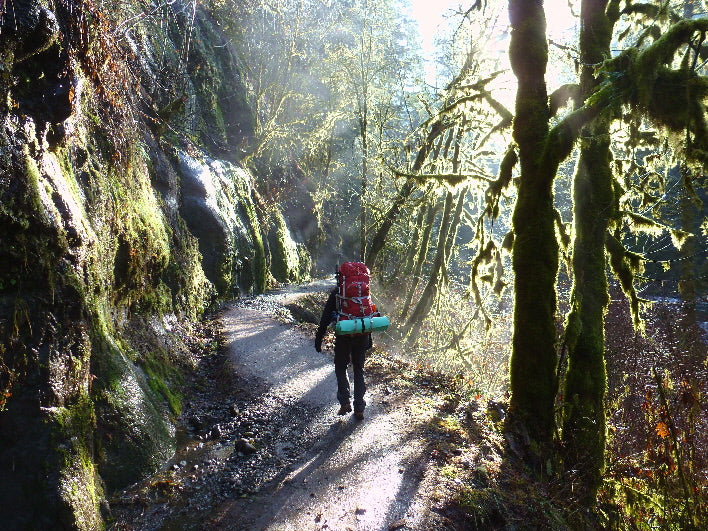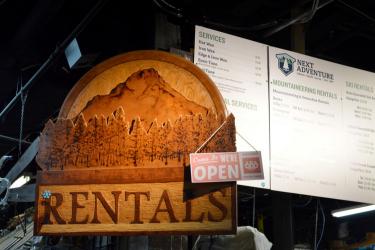
TRIP REPORT: Eagle Creek Trail Backpack

The Eagle Creek Trail may just be THE trail to hike in Oregon. It's got it all, with spectacular wilderness views, more waterfalls than you can name, and green, mossy, misty northwest forests. It is an historical engineering marvel, blasted out of sheer cliff walls, and amazingly well-graded for the rugged topography it traverses. It is the perfect trail for every hiking desire, with incredible natural wonder destinations that allow for short to longer day hikes and backpacking adventures.

Unsurprisingly, Eagle Creek is a very popular trail. Summer weekends, with hundreds of people on the trail, provide little sense of wilderness.
The trick is to not go to the popular trails when everyone else is there. Winter is the perfect antidote to the crowds. If you like moss and waterfalls, then you'll appreciate how wet and green everything is, too.
So when the snow didn't fall on Mt. Hood in January, I hit the trail at lower elevations in the Columbia Gorge. Seeking more than a day hike, we backpacked in and camped in the wilderness up the Eagle Creek Trail.
THE HIKE
A NW Forest Pass was required to park at the trailhead, but there was ample parking available in the lot.
The trail was muddy from recent rains, but the sun shone through the clouds. It was primeval, the light magical through the trees and the mist swirling about. In less than a mile the path climbed up the cliffs to the first of the blasted-out sections, complete with cable railings embedded in the basalt.
The side trails leading to the Metlako Falls viewpoint appeared after a mile and a half up the trail. A beautiful falls in a misty chasm and a good spot to take a break. The next ridge brought us to the Lower Punchbowl Falls trail. Down we went to the riverside and picknicked on the cobble beach.
In Summer, when less water is flowing, you can walk out on the beach and look upstream to the iconic Punch Bowl Falls. But with high winter flows, the beach was reduced. I took off my shoes and socks and waded out to get this shot of Punch Bowl.
Punchbowl Falls is a perfect destination for a short day trip, only 4.2 miles round-tip and 400 feet elevation gain. But we were going tent camping further up the trail. Camping is only allowed in four designated campsites along the first 7.5 miles of the Eagle Creek Trail, and none of them are less than 3.7 miles from the trailhead.

High Bridge is another good day-hike destination, just 3.3 miles from the trailhead. A very high bridge crosses a deep, narrow slot-like gorge (think Oneonta Gorge), and the trail continues on the West side of the river. Tenas Camp is the first designated camping area, but it is close to the trail, high above the river, and water is not easily accessible. So we kept on hiking, crossing back to the other side of the river at Four-and-a-half Mile Bridge.

WyEast Camp is perched near the river, and has some nice level sites. But we wanted to camp in the wilderness, and just a little further up the trail, the official Hatfield Wilderness began. Soon after the Eagle-Benson trail juncture, we came to Blue Grouse Camp, secluded from the trail enough that we hiked past it and had to come back to it.


Camp set up, a visit to the river, and then sunset came early (it is winter, after all) and we had dinner in the dark: water boiled on my JetBoil stove to make a Backpacker's pantry back-country meal.
There were stars visible between the tall trees, and the stillness of the wilderness all around us that night.
We woke up in the wilderness, the stream churning through its basalt chasm below us, the deep forest surrounding us. Pre-empting breakfast, we set out for the short hike to Tunnel Falls - 6 miles from the Trailhead, but only half a mile from our camp. If you are day-hiking the Eagle Creek Trail, hiking to Tunnel Falls and back would be a 12 mile journey, with 1200 feet of elevation gain.
TUNNEL FALLS DAY HIKE
True to its name, Tunnel Falls has a passage blasted through the rock behind the falls. Along with the sheer drop-offs of the trail blasted out of the cliff, this is certainly not the place to bring unruly children, and may not be pleasant for those with a fear of heights. But you don't have to go through the tunnel to enjoy a spectacular view of the falls, churning 120 feet over the lip of a cliff, the falls plunge into a coumnar basalt bowl. Ever-present mist from the falls keeps moss and lichen green year-round, but especially verdant in the winter.

Back in camp, we enjoyed oatmeal for breakfast and then lounged riverside, watching some dippers zip up and down stream.
Other birds flitted about the trees. We marveled at all of the different kinds of moss and lichen on just one fallen tree branch. I even found a patch of mushrooms and some other lichens.


Grudgingly, we packed up camp and started the backpack out. It was just as spectacular going the other way. We saw even more waterfalls that we had just hiked past the day before. There were less people on the trail for the hike out, so we were able to sustain that sense of wilderness solitude as we contemplated the gorge views and appreciated the work that went into making the trail.

Nights are longer in winter, so don't forget your headlamp and extra batteries. Not only will you be needing more light in camp and in the tent, but sunset can quickly surprise you on the trail. Be prepared.
The lower elevation trails of the Columbia River Gorge are accessible year-round. With the warm winter the mountains have seen, trails are clear of snow up to 5000 feet elevation. Be ready for cooler nights, and always check the weather forecast before you head out (mountains are notorious for fast-changing weather), but this is the year to extend your hiking and backpacking season further than ever before.
Gear up at Next Adventure and take a hike!


